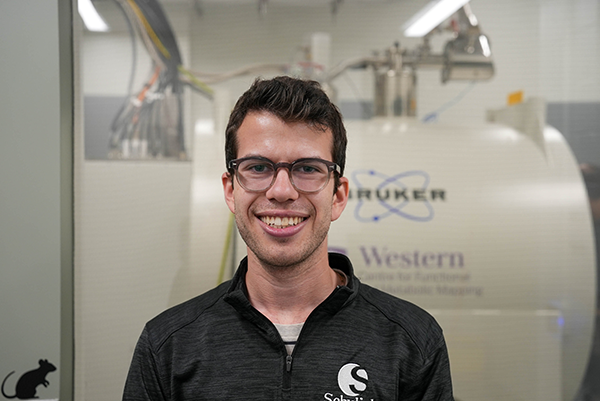Admissions
Equity, Diversity, Inclusion and Decolonization
The School of Graduate and Postdoctoral Studies is committed to equity, diversity, inclusion and decolonization in all aspects of graduate and postdoctoral studies. For more information regarding these commitments please visit grad.uwo.ca/edi-d.
Medical Biophysics
Master of Science (MSc)Meet Sam Laxer, MSc student transferred to PhD program in Medical Biophysics

Supervisor: Dr. Ravi Menon
Describe your research.
I study an MRI technique called Functional Magnetic Resonance Imaging (or fMRI) which is used to measure brain activity. It works by measuring the differences in magnetic properties between oxygenated and deoxygenated blood. When brain regions are active, they use up more oxygen and thereby require an increased supply. This is achieved through communication between neurons, astrocytes, and nearby vasculature. However, the mechanisms behind this communication throughout the brain are still largely unknown. My research is focused on better understanding these mechanisms.
Where is “home” for you?
I was born and raised here in London, so I guess you can say I am not too far from home.
Do you engage in any volunteer activities?
I have volunteered for various events throughout my grad school degree, most of which were related to graduate studies. A few of these including serving as an academic mentor for an incoming graduate student within Medical Biophysics, presenting my work at a retirement home for the residents living there, and serving as a science fair judge for primary school students.
What one thing would you like people to know about you?
I make world-class French toast and grilled cheese sandwiches (self-proclaimed).
What’s the best advice you could give to someone considering applying to your graduate program?
In my opinion, the most important consideration is ensuring you are a good fit for the lab (and the lab is a good fit for you). This includes having an interest in the project you will be working on, along with having a good relationship with your supervisor and other colleagues in the lab. Beyond that, I would also make sure that the skills and credentials you get from the program will help you achieve what you want to do after graduate school.
Program Websites
Program Contact
Elizabeth Oliveira (askmbp@schulich.uwo.ca)Graduate Recruitment Coordinator
Department of Medical Biophysics
Western UniversityMedical Sciences Building (MSB) Room #443
London, Ontario N6A 5C1
t. 519-661-2111 ext. 88030
f. 519-661-2123
The Department of Medical Biophysics works very closely with other university departments, research institutes, and hospitals in the City of London to offer unique graduate training opportunities in diverse fields including: cardiovascular disease, microcirculation, hemodynamics, biomechanics, and cancer. Biomedical imaging (CT, MRI, MRS, ultrasound, SPECT, PET-CT, PET-MRI, optical, photoacoustic) is a vigorous research area at the cellular, small-animal, pre-clinical, and clinical scale in our department. Our research program therefore gives students a chance to work with state-of-the-art equipment, often combining computational and experimental techniques.
The work of all our students, considered collectively, represents substantial accomplishments in a wide spectrum of physical, biological, and clinical science. Following graduation, you will find a rewarding career in the health care sector, biomedical industry, and academia; others pursue further training in professional schools such as medicine, dentistry, or business.
Program Length
- 6 Terms
Program Design
- Full-time study
- Thesis-based
Funding Information
Applicants are encouraged to apply for the following scholarships (if eligible):
Tuition and Fees
Tuition and fee schedules (per term) are posted on the Office of the Registrar's website at http://www.registrar.uwo.ca/student_finances/fees_refunds/fee_schedules.html
Graduate Student Affordability Calculator
Use this helpful tool to estimate how much money you will need to pay for your tuition, fees, housing, food, and other necessities for a 12-month (three term) academic year.
Admission Requirements
- A four-year degree (or equivalent) from a recognized university or college, with preference given to those in a STEM (Science, Technology, Engineering and Math) discipline.
- Consideration will be given to applicants with a minimum of a 78% average, but preference given to applicants with a minimum of an A- or 80% average (final two years).
English Language Proficiency
Applicants whose first language is not English must furnish evidence of their proficiency in the use of the English language:
- The Test of English as a Foreign Language (TOEFL). iBT (internet-Based Test): The minimum acceptable score is 86, with no individual score below 20. PdT (Paper-delivered Test): The minimum acceptable total score is 65, with no individual score below 20. Please note that some programs require a higher minimum and/or band score. [Western's TOEFL ID is 0984].
- The International English Language Testing Service (IELTS Academic). The minimum acceptable score is 6.5 out of 9. The IELTS is offered in 6 test
centres in the US and 3 in Canada. - The Canadian Academic English Language Assessment (CAEL Assessment). The minimum acceptable score is 60. The CAEL Assessment is offered in several countries throughout the world as well as Canada.
- Western English Language Centre. The requirement is successful completion of the High-Advanced level.
- Fanshawe College’s ESL Program. The requirement is graduation from Level 10, English for Academic Purposes, with a minimum 80% in all components.
Application Deadline
- June 1 – Fall Term
- November 1 – Winter Term
- March 1 - Summer Term






